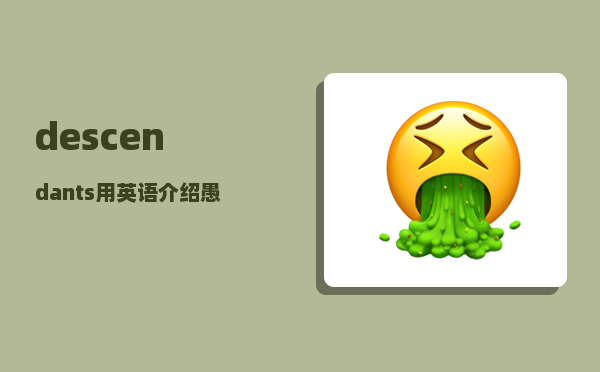descendants_用英语介绍愚公移山的故事70字
descendants,用英语介绍愚公移山的故事70字?
"Yugong Moving Mountains" is a fable story of the ancient Chinese Han nationality. It is selected from "Liezi Tangwen", by the imperial aggressors of the Spring and Autumn Period and the Warring States Period.

"Yugong Moves Mountains" tells the story of Yugong who fears hardships, perseveres, digs mountains and finally moves the mountains away by touching the Emperor of Heaven.
There were two mountains in front of Yu Gong's house. He was determined to level them down. Another wise man laughed at him for being too foolish to think he could. Yu Gong said, "I have sons dead, sons dead and grandsons. There are endless descendants. Why should I worry about unemployment?" Afterwards, he moved the Emperor of Heaven, so the Emperor ordered his two sons to move two mountains
龙的传人英语演讲稿?
Descendants of the dragon
The dragon is considered to be auspicious in China.
People hold Dragon-boat race in memory of Qu Yuan on the 5th Of the fifth lunar month.
The dragon is quite familiar to most Chinese.
The Chinese consider the dragon to be an auspicious deity with absolutpower,while the westerners consider the dragon the embodiment of evil.
Although the dragon is quite familiar to most Chinese,nobody had ever seen a real one.
In China there are a lot of interesting stories about the dragon.
The Chinese also regard themselves as the scions of Huang Di and Yan Di
Dragon-worship has found a way into every aspect of life in China.
The Chinese like to compare China to a giant dragon flying over the east of the world.
There are many buildings in China with dragons on them such as the Nine-dragon Wall in Beijing.
emperors always regarded themselves as the true sons of the dragon. So in the palace you will find yourself surrounded by the dragon. Also such ornaments could be found on the clothes they used to wear and the things they used.
origin的所有词性及意思?
origin
这个单词只有一个词性, 是名词
具体词义:
n.出身; 起源,根源; [数] 原点,起点; [解] (筋,神经的) 起端
origin
音标['ɒridʒin] 读音 
汉语翻译
n. 起源, 起因, 出身, 开端
【计】 原点; 起始地址; 信件来源的相关数据
【医】 起端, 起
【经】 产地
词意辨析:
origin, source, root
这些名词均有“起源、起因、根源”之意。
origin: 侧重指事物的起源或由来,也指人的出身。
source: 本义指河流或瀑布的源头,引申指某事的来源出处,但更多指抽象事物的根源或来源。
Root: 通常指事物产生的原因或根源。
英语解释:
名词 origin:
the place where something begins, where it springs into being
同义词:beginning, root, rootage, source
properties attributable to your ancestry
同义词:descent, extraction
an event that is a beginning; a first part or stage of subsequent events
同义词:origination, inception
the point of intersection of coordinate axes; where the values of the coordinates are all zero
the descendants of one individual
同义词:lineage, line, line of descent, descent, bloodline, blood line, blood, pedigree, ancestry, parentage, stemma, stock
例句:
The illness is organic in origin.
该病起初是器质性疾患。
The theory that all geologic phenomena may be explained as the result of existing forces having operated uniformly from the origin of the earth to the present time.
(地)均变说一种理论,可以将所有地质现象解释为从地球起源到现在已均匀作用的现存力的结果
The social unrest has its origins in economic problems.
社会动荡是经济问题引起的。
He is a Dane by origin.
他原籍丹麦。
详细解释:
or.i.gin
n.Abbr. orig.(名词)缩写 orig.
The point at which something comes into existence or from which it derives or is derived.
起源:事物开始存在或起源或取得的始点
Ancestry:
出身,血统:
例句:
.We cannot escape our origins, however hard we try.(James Baldwin)
.无论如何努力,我们也改变不了我们的出身.(詹姆斯·鲍德温)
The fact of originating; rise or derivation:
起源:引发的事实;产生或起源:
例句:
The rumor had its origin in an impulsive remark.
谣言源于一次冲动的谈话
Anatomy The point of attachment of a muscle that remains relatively fixed during contraction.
【解剖学】 起端,起:肌肉的附着点,在肌肉收缩时保持相对的固定
Mathematics The point of intersection of coordinate axes, as in the Cartesian coordinate system.
【数学】 原点:坐标轴的交点,比如在笛卡尔坐标中
来源:
Middle English origine [ancestry]
中古英语 origine [祖先]
from Latin orogô orogin-
源自 拉丁语 orogô orogin-
from ororo [to arise, be born] * see er-
源自 ororo [起源] *参见 er-
<参考词汇><同义词>origin,inception,source,rootThese nouns signify the point at which something originates.
这些名词意指某物的起源。
Origin is the point at which something comes into existence:
Origin 是指事物出现的始点:
例句:
The origins of some words are unknown.
这些词的起源是不知的。
例句:
.Man with all his noble qualities . . . still bears in his bodily frame the indelible stamp of his lowly origin. (Charles Darwin).Whenorigin refers to people, it means parentage or ancestry:
.人尽管有着他所有的高贵品质…但仍在其身上有出身低微的抹不掉的烙印. (查尔斯·达尔文)。当origin 指人时,它的意思是父母双亲或出身:
例句:
.He came . . . of mixed French and Scottish origin. (Charlotte Brontô).
.他有着法国和苏格兰的混合血统. (夏洛蒂·勃朗特)。
Inception is the beginning,as of an action or process:
Inception 意指开始,比如一个行动或过程:
例句:
Between the inception of the litigation and its final disposition the plaintiff`s first attorney retired.
在诉讼开始至结束间,原告的第一任律师被解雇了。
Source can refer to the point of origin of a stream or a river:
Source 指溪流或河流的发源点:
例句:
.the Alpine sources of the Rhine. (John Foster Kirk).In another sense the term signifies the point at which something springs into being or from which it derives or is obtained:
.莱茵河源自阿尔卑斯山. (约翰·弗斯特·柯克)。该词的另一含意表示事物开始出现的始点或其来源与出处:
例句:
.one great original source of revenue . . . the wages of labor. (Adam Smith).
.财富的一大起源是劳动力的工资. (亚当·史密斯)。
例句:
.The mysterious . . . is the source of all true art and science. (Albert Einstein).
.所有真正的艺术和科学的起源是神秘的. (阿尔伯特·爱因斯坦)。
Root often denotes what is considered the fundamental cause of or basic reason for something:
Root 经常表示被认为是事物的根本起因或基本原因。
例句:
.Lack of money is the root of all evil. (George Bernard Shaw).
.缺钱是所有罪恶的根源. (乔治·萧伯纳)。
例句:
.Most of the problems a President has to face have their roots in the past. (Harry S Truman).
.一位总统不得不面临的大多数问题都是有前因的. (哈利·S·杜鲁门
英文版愚公移山简写加注解?
Yugong was a ninety-year-old man who lived at the north of two high mountains, Mount Taixing and Mount Wangwu.Stretching over a wide expanse of land, the mountains blocked yugong's way making it inconvenient for him and his family to get around.
太行,王屋二山的北面,住了一个九十岁的老翁,名叫愚公。 二山占地广阔,挡住去路,使他和家人往来极为不便。
One day yugong gathered his family together and said,"Let's do our best to level these two mountains. We shall open a road that leads to Yuzhou. What do you think?"
一天,愚公召集家人说:「让我们各尽其力,铲平二山,开条道路,直通豫州,你们认为怎样?」
All but his wife agreed with him."You don't have the strength to cut even a small mound," muttered his wife. "How on earth do you suppose you can level Mount Taixin and Mount Wanwu? Moreover, where will all the earth and rubble go?"
大家都异口同声赞成,只有他的妻子表示怀疑,并说:「你连开凿一个小丘的力量都没有,怎可能铲平太行、王屋二山呢?况且,凿出的土石又丢到哪里去呢?」
"Dump them into the Sea of Bohai!" said everyone.
大家都热烈地说:「把土石丢进渤海里。 」
So Yugong, his sons, and his grandsons started to break up rocks and remove the earth. They transported the earth and rubble to the Sea of Bohai.
于是愚公就和儿孙,一起开挖土,把土石搬运到渤海去。
Now Yugong's neighbour was a widow who had an only child eight years old. Evening the young boy offered his help eagerly.
愚公的邻居是个寡妇,有个儿子八岁也兴致勃勃地走来帮忙。
Summer went by and winter came. It took Yugong and his crew a full year to travel back and forth once.
寒来暑往,他们要一年才能往返渤海一次。
On the bank of the Yellow River dwelled an old man much respected for his wisdom. When he saw their back-breaking labour, he ridiculed Yugong saying,"Aren't you foolish, my friend? You are very old now, and with whatever remains of your waning strength, you won't be able to remove even a corner of the mountain."
住在黄河河畔的智叟,看见他们这样辛苦,取笑愚公说:「你不是很愚蠢吗?你已一把年纪了,就是用尽你的气力,也不能挖去山的一角呢?」
Yugong uttered a sigh and said,"A biased person like you will never understand. You can't even compare with the widow's little boy!""Even if I were dead, there will still be my children, my grandchildren, my great grandchildren, my great great grandchildren. They descendants will go on forever. But these mountains will not grow any taler. We shall level them one day!" he declared with confidence.
愚公叹息道:「你有这样的成见,是不会明白的。 你比那寡妇的小儿子还不如呢!就算我死了,还有我的儿子,我的孙子,我的曾孙子,他们一直传下去。 而这二山是不会加大的,总有一天,我们会把它们铲平。 」
The wise old man was totally silenced.
智叟听了,无话可说:
When the guardian gods of the mountains saw how determined Yugong and his crew were, they were struck with fear and reported the incident to the Emperor of Heavens.Filled with admiration for Yugong, the Emperor of Heavens ordered two mighty gods to carry the mountains away.
二山的守护神被愚公的坚毅精神吓倒,便把此事奏知天帝。 天帝佩服愚公的精神,就命两位大力神背走二山。
进化树怎么看?
首先来学习一下系统发育树的基本结构。故名思意,系统发育树具有与树类似的结构:
最基部为根节点(root)。有的树有,有的树没有。
从根开始生长,每次分出两条枝(branch)。
枝生长到一定程度后,再次分枝的地方称为内节点(internal node)
树的最末端称为叶节点(leaf),有时候也叫tip。
包含多个叶节点的分支称为进化枝(clade)。
以上是树的基本结构。如果只有这些结构,还不能称其为系统发育树,只能说是一个树状图。只有当我们赋予该树状图以生物学意义的时候,才能称为系统发育树:
一个叶节点代表一个生物类群(taxon),如人类。
一个内部节点代表一个假想的祖先(ancestor)。这个祖先在历史中存在,但往往已经灭绝。为什么要加上“假想”,是因为我们没有确切的证据去证明这个祖先到底是什么。人类、倭黑猩猩、黑猩猩的汇集处代表这三者的共同祖先,由于这个节点距离这三个类群最近,所以把该节点称为这三个类群的最近共同祖先(Most Recent Common Ancestor, MRCA)。与祖先对应的词汇是后代(descendants)。
枝的长度用于衡量祖先和后代之间的远近。根据树的构建方法不同,枝的长度可以有不同含义。如果使用基于进化模型的方法(贝叶斯法/最大似然法),枝的长度代表碱基替换速率。如果使用基于距离的方法则代表的是距离。因为用于构树的性状、构树的方法对枝长影响很大,所以不同的树之间的距离往往无法直接比较。有些系统发育树的枝长会被忽略掉,此时枝的长度是没有意义的。
根节点代表所有类群的共同祖先。不是所有系统发育树都是有根的,没有根的系统发育树称为无根树。
除了以上基础结构,有的系统发育树还包含以下内容:
支持度:内部节点有时候会有一个数字,称为支持度(support value),用于代表该分支结构的可靠程度。值的大小在0%-100%之间。和枝长一样的是,支持度也有不同的计算方法,如普通的bootstrap value、Ultra fast bootstrap、后验概率等。值越大,说明越多证据支持该分支。
外群/外类群(outgroup):目标类群之外的类群。如果我们的目标类群是人类和黑猩猩,那么可以选用大猩猩来作为外群。外群一般用于给系统发育树赋根,赋根之后我们才能从进化树上看出演化的先后顺序。
演化时间:如果能够找到明确的历史记录或者化石证据,确切地知道某个已经灭绝的物种曾经存在的时间,就可以用于校正系统发育树的时间。经过校正的系统发育树有时候称为time tree。
常见问题



